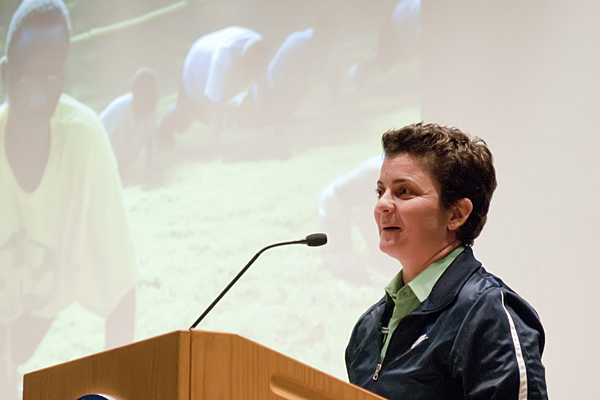
Fugees family
Inspirational coach shares stories of soccer, life with UD community
1:45 p.m., Nov. 15, 2011--Luma Mufleh grew up in Amman, Jordan, as a privileged child served by maids and nannies, chauffeurs and cooks. She was a gifted athlete whose wish lists included expensive bicycles and high-end soccer shoes. But Mufleh’s life changed when she met a child who played soccer wearing just one shoe.
On Monday, Nov. 14, Mufleh shared the story of her life as coach of the Fugees soccer team with the University of Delaware community. The presentation kicked off UD’s International Education Week.
Global Stories
Fulbright awards
Peace Corps plans
After graduating from Smith College in 1997, Mufleh found herself directionless and drifting from job to job.
“I was afraid of failure,” she said, “but I was terrified of success because success meant money and status. I didn’t know what I wanted to do.”
But Mufleh unexpectedly found direction in Clarkston, Ga., home to a large number of resettled refugees from countries plagued by war, oppression and violence. She approached a group of kids playing street soccer and asked if she could join them.
Reluctantly—because she was a “girl”—they let her play, and after an hour of scrappy, sweaty soccer, Mufleh finally had something to be excited about.
“There was a child who had only one shoe,” she said. “He wore it on his kicking foot, and he didn’t seem to have a care in the world. When we were finished, he took off the shoe and walked home in flip-flops. He was eight years old.”
That night, Mufleh put away her own kangaroo leather cleats. “I promised myself that I wouldn’t wear them again until all my kids had them.”
The kids quickly became her kids, and the Fugees grew into not only a soccer team but also a community. Mufleh started as coach but soon realized that she would also have to be at times parent, tutor, mentor and advocate. Her players lived in poverty, usually in large families with single mothers who worked long days but still didn’t earn enough to keep food on the table when the food stamps ran out at the end of the month.
To help meet the complex needs of her kids and their families, Mufleh launched a cleaning service and a food truck business to employ refugees and immigrants in the community.
As she worked with this community, her definition of excellence changed. “It’s not how many games we win but how many kids have stayed in school,” she said. “It’s not how much money the businesses make but how many people are employed.”
This past May, Mufleh said, she was reminded of “the power of this country” when one of her kids—a goat herder’s son from Sudan—graduated from college.
But she stubbornly refuses to rest on this apparent success. “We now have 18 kids in college,” she said, “but I’ve been to more court dates than college graduations. When that number reverses, I’ll consider us successful.”
Mufleh’s parting advice for the audience? “Live every day with no regrets, stand up for what you believe in, and remember—you only need one shoe.”
Following the lecture, she fielded more than a dozen questions from students who wanted to know more about the challenges she’s faced and the lessons she’s learned.
According to Mufleh, it’s always a roller coaster of emotions, and sometimes it’s downright funny.
She shared the story of the night she took her players to a Golden Corral buffet for dinner after a game. She was appalled to see their plates piled high with a mix of foods from spaghetti and fried chicken to jelly beans and soft-serve ice cream.
“What’s wrong, Coach?” they asked when they saw the look on her face. “You said we could have all we can eat.”
“I know,” she said, “but not all at the same time. You can go back.”
“We can go back for seconds?”
“You can go back as many times as you want.”
They couldn’t believe it.
About the Fugees
Fugees Family, Inc. is a non-profit organization devoted to working with child survivors of war. It builds upon the power of soccer to galvanize children by giving them the support and structure they need to realize their vast potential. Since the initial Fugees team was started, the program has grown to include year-around soccer for 86 boys and girls aged 10-18, after-school tutoring and soccer for 50 elementary-aged students, a private academy serving 36 students, and an academic enrichment summer camp.
The story is documented in Outcasts United, written by New York Times reporter Warren St. John. The book focuses not only on the inspirational journey of Mufleh and the refugees, but also on the lessons the story provides on how we build community in environments in which people seem to have little in common. The story is being made into a motion picture by Universal Studios.
Mufleh’s latest endeavor is building the Fugees Academy, the first school for refugee boys and girls in the U.S.
For additional information, see the organization’s website.
Article by Diane Kukich
Photo by Doug Baker








